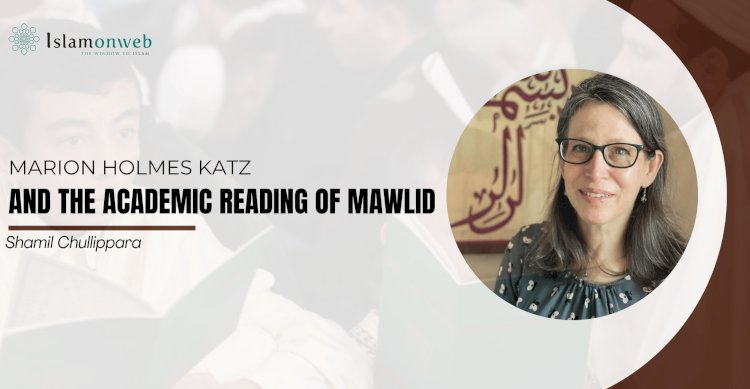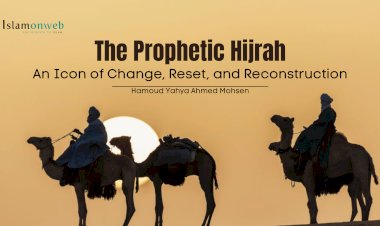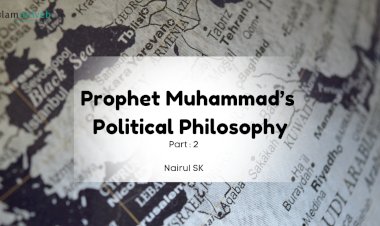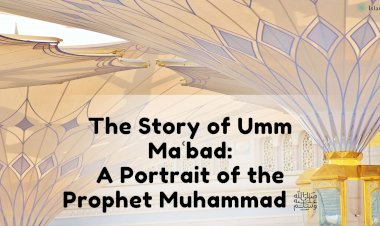Marion Holmes Katz and the Academic Reading of Mawlids
Marion Holmes Katz, an assistant professor in the Department of Middle Eastern Studies at New York University and a respected scholar in the field of Islamic studies, has undertaken a detailed academic analysis of Mawlid celebrations. Her work examines the texts, history, and celebration of Mawlids, offering a comprehensive scholarly perspective rooted in both historical context and devotional practice.
No figure in human history has inspired such widespread literary and devotional engagement as the Prophet Muhammad ﷺ. Even Western scholars of other faiths, such as Annemarie Schimmel, Martin Lings, and Karen Armstrong, have expressed sincere admiration for him. Among the many devotional forms that celebrate the Prophet ﷺ, the Mawlid—poetic narratives recounting his birth and noble qualities—holds a prominent place. These texts, composed and recited across centuries and cultures, reflect deep love and reverence. Among contemporary studies on this tradition, Marion Holmes Katz’s work stands out as a significant academic contribution.
Her book, The Birth of the Prophet: Devotional Piety in Sunni Islam, explores the emergence, textual authenticity, political relevance, and contested reception of the Mawlid.
Katz's interest in Mawlids began in 1997 during her time in Damascus. She encountered printed leaflets in the city’s streets containing praise of the Prophet ﷺ. One such text was Mawlid al-ʿArūs, attributed to the twelfth-century scholar Ibn al-Jawzī. With a strong foundation in Islamic sciences—Qur’an, ḥadīth, kalām, and philosophy—she was drawn to the literary and spiritual depth of the text. This initial engagement eventually evolved into a focused academic pursuit of the Mawlids genre.
Published in 2007, her book consists of 287 pages divided into five thematic chapters:
- The Emergence of Mawlid Narratives – Traces the historical development of Mawlid literature.
- Gifts and Reciprocity in the Celebration of the Mawlid – Examines gift-giving practices and their symbolic meanings.
- Emotion, Law, and the Celebration of the Mawlid – Discusses the interplay of legal discourse, emotional expression, and festivity.
- Time and Merit in the Celebration of the Mawlid – Explores temporal symbolism and the concept of divine reward associated with Mawlid observances.
- Mawlids Under Attack – Analyses criticism and opposition, particularly from reformist and Wahhabi circles.
Marion Holmes Katz’s study is valued for its scholarly rigour, original insights, and balanced treatment of a topic often approached polemically. Her work has helped broaden the understanding of devotional practices in Sunni Islam and offered a critical lens through which to appreciate the Mawlid as both literature and lived tradition.
Historical Context of Mawlids in Holmes’ Study
In her study, Marion Holmes Katz traces the history of Mawlid celebrations to the reign of Muḥammad Tawfīq Pasha (1879–1892) in Cairo, where the observances spanned twelve days. These celebrations featured night-time dhikr gatherings, public recitations of Mawlid texts, and elaborate street decorations. On the 12th of Rabīʿ al-Awwal, the ruler himself would take part in the ceremonies. Holmes also notes that even the Ottoman Sultan ʿAbd al-Ḥamīd II marked the Prophet’s ﷺ birth by distributing sweets to schoolchildren and granting bonuses to state officials. She highlights that by the nineteenth century, Mawlid celebrations had become widespread across various regions of the Muslim world.
Holmes further explores the development and formalisation of Mawlid texts, tracing their roots to the 6th century AH. Originating primarily in Iraq and Iran, these texts eventually reached Andalusia and the Maghrib. Among the earliest notable compositions she discusses are:
- Risālat Badʿī fī Bayān Mawlid al-Nabī by Qāḍī ʿIyāḍ ibn Mūsā al-Yaḥṣubī, a prominent Mālikī scholar, which narrates the Prophet’s ﷺ birth, noble lineage, miracles, miʿrāj, and passing.
- Al-Durr al-Munallam fī Mawlid al-Nabī al-Aʿẓam by Aḥmad ibn Maʿd al-Iqlīshī.
- Al-Khumam fī Mawlid Sayyid al-Tamām by Muḥammad al-Qurṭubī.
Through this historical lens, Holmes presents the Mawlid not merely as a devotional expression but as a literary and communal tradition rooted in diverse Islamic cultures and evolving across centuries.
Opposition to Mawlids in Holmes’ Study
Marion Holmes Katz also explores the criticism and resistance directed at Mawlid celebrations, particularly from Wahhabi quarters. The Wahhabi movement, founded by Muḥammad ibn ʿAbd al-Wahhāb, objected to such observances on the grounds that excessive veneration of the Prophet ﷺ could compromise tawḥīd (the oneness of God). Wahhabi-influenced governments, especially in Saudi Arabia, actively discouraged public Mawlid commemorations.
In the 20th century, modernist reformers such as Rashīd Riḍā also voiced opposition to the tradition, calling for a re-evaluation of inherited religious practices in light of rationalist and reformist principles. Despite such resistance, Mawlid celebrations persisted in the Ḥaramayn, Makkah and Madinah, where efforts were made to defend and legitimise the practice.
One of the foremost defenders was Muḥammad ʿAlī ibn Ḥusayn al-Mālikī, Mālikī Muftī of Makkah, who authored several treatises countering Wahhabi critiques and affirming the spiritual and communal value of Mawlid gatherings. Marion Holmes also refers to the Dutch orientalist Christiaan Snouck Hurgronje, whose account of a six-month stay in Makkah (1884–1885) records the vibrancy of Mawlid processions, including illuminations with lamps and widespread public recitations.
Further, she cites the support of renowned Syrian scholar Shaykh Muḥammad Saʿīd Ramaḍān al-Būṭī, who maintained that Mawlid celebrations, when free of prohibited acts, serve to deepen love for the Prophet ﷺ and strengthen religious identity.
Holmes' work, published by the reputable academic publisher Routledge, is distinguished by its meticulous documentation and balanced treatment. Her analysis offers a nuanced understanding of both the devotional and contested dimensions of Mawlid observance in the modern period.
Other Scholarly Contributions
Apart from Marion Holmes Katz, other scholars have made valuable contributions to the academic discourse on Mawlids. Among them is Oludamini Ogunnaike, assistant professor in the Department of Religious Studies at the University of Virginia. His research explores the philosophical dimensions of Islamic and indigenous religious traditions in North and West Africa across pre-colonial, colonial, and post-colonial periods. His 2020 publication, Poetry in Praise of Prophetic Perfection: A Study of West African Arabic Madīḥ Poetry and Its Precedents, released by the Islamic Texts Society, sheds light on the rich tradition of devotional poetry in West Africa, situating it within both local and global contexts of praising the Prophet ﷺ.
Another noteworthy study is that of El-Sayed El-Aswad, Professor of Anthropology and Head of the Sociology Department at Tanta University, Egypt. In his research published in August 2015, he examines the variations in Mawlid observance between Sunni and Shīʿī communities—Sunnis commemorating on the 12th of Rabīʿ al-Awwal and Shīʿīs on the 17th. His study also highlights cultural dimensions of the celebration, including the preparation of distinctive dishes such as Qarūṣat in Egypt and Bukūlah in Indonesia.
While these works enrich the broader understanding of Mawlid traditions across regions, Marion Holmes Katz’s study remains unparalleled in its scholarly rigour and pioneering approach to the genre.
About the author
Shamil Chullipara is a Sub Researcher at Markaz Knowledge City and a graduate student in the Rafiee program at Jamia Majmaʿu Taẓkiyathil Islamiyy, Vettichira, Malappuram. He is the author of Thenaruakal (IPB Books) and has presented papers at notable forums, including Dhaka University (Bangladesh), Islahiul Uloom Arabic College in Tanur, and Muhimmath Arabic College in Kasaragod. Additionally, Shamil is a writer and translator.
References
- Holmes, M. (2007). The Birth of the Prophet: Devotional Piety in Sunni Islam. Routledge.
- Ogunnaike, O. (2020). Poetry in Praise of Prophetic Perfection: A Study of West African Arabic Madīḥ Poetry and its Precedents. Islamic Texts Society.
- El-Aswad, E. (2015). Mawlid Celebrations among Sunni and Shia Communities: A Comparative Study. Tanta University.
Disclaimer
The views expressed in this article are the author’s own and do not necessarily mirror Islamonweb’s editorial stance.
























Leave A Comment